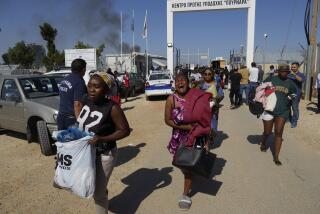Cyprus scrambles to put together bailout package
ATHENS -- Racing against time and short on choices, Cyprus on Friday moved to vote on yet another bailout formula its government cobbled together to secure a $13-billion international lifeline that will keep its weak banks afloat and avert a devastating default.
Failure to produce a viable bailout scheme by Monday will force the European Central Bank, according to an ultimatum it issued earlier this week, to stop funneling billions of dollars into Cyprus’ cash-strapped financial system, leaving the island nation to fend for itself.
Though Cyprus has a small economy accounting for 0.2% of economic output in the Eurozone, the 17 nations that use the euro currency, letting the island go under could have a ripple effect on the region and perhaps beyond, officials and analysts fear.
Cypriot lawmakers have been seeking alternative funding formulas since rejecting a deal between the government, the European Union and the International Monetary Fund that would have forced Cypriots to chip in through an emergency tax of up to nearly 10% on their bank deposits, a move that would have raised $7.5 billion to go along with the $13-billion aid package.
Now, politicians said the government was considering reviving the levy on savings in a desperate bid to win back the support of international lenders. On Friday, President Nicos Anastasiades held back-to-back meetings with EU, IMF and European Central Bank representatives on the island, adding the finishing touches to a compromise deal.
Parliament was due to vote on the plan later in the day.
“It will be a difficult decision,” government spokesman Chrisostoms Stylianides told reporters. “The plan features some painful elements but the country has to be saved.”
That the government was reconsidering Europe’s original demands after flatly rejecting them illustrated just how desperate and short of choices Cyprus was after a flurry of failed initiatives to secure financial help from Russia.
After two days of crisis talks with his Russian counterpart, Cypriot Finance Minister Michalis Sarris returned to Nicosia, the Cypriot capital, on Friday, conceding that neither the Kremlin nor Russian investors were interested in any of the offers he had made.
Details of the bailout formula have yet to be announced. But reports say that a savings tax of up to 17% could be imposed on deposits over $130,000. Eight other pieces of legislation are being lined up to guide the restructuring of Cyprus’ most indebted bank and the management of state assets, including the Orthodox Church’s vast portfolio. Capital controls on lenders will also be introduced to stem the outflow of money from the island.
Ahead of the debate in parliament, hundreds of angry Cypriots gathered outside the nation’s parliament to protest the possible new bailout plan. Other residents stood in long lines to withdraw money from ATMs.
Analysts fear that as much as $30 billion could be pulled out of the banks when they reopen Tuesday, which could have consequences on neighboring countries.
“If this proves uncontrollable and unsustainable, Cyprus may go up in flames, singeing Spain and Italy,” said Alexander Apostolides, a leading economic analyst in Nicosia.
ALSO:
Nigerian author Chinua Achebe, 82, dies
Scotland to vote on independence in September 2014
Obama brokers Israeli apology for Turkish activists’ deaths
More to Read
Start your day right
Sign up for Essential California for news, features and recommendations from the L.A. Times and beyond in your inbox six days a week.
You may occasionally receive promotional content from the Los Angeles Times.






